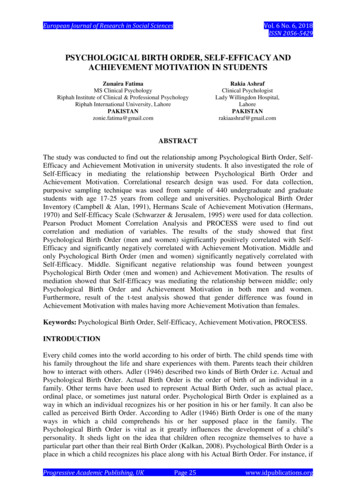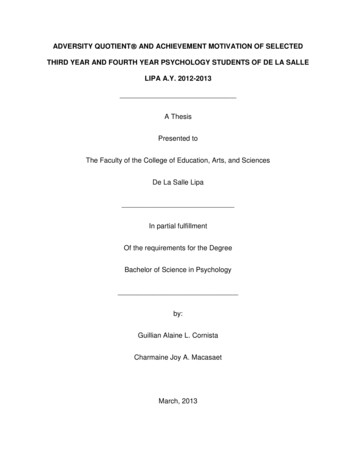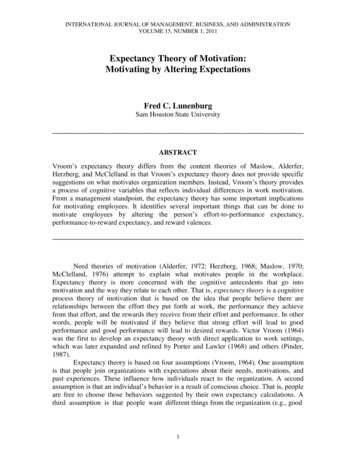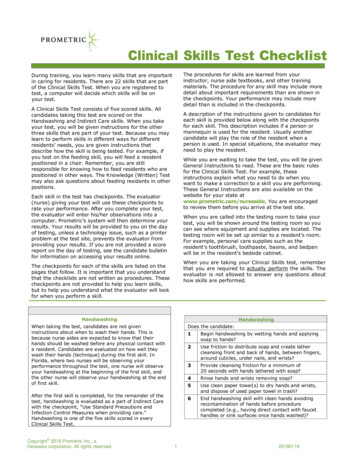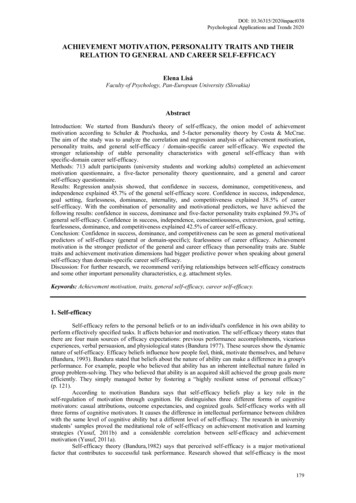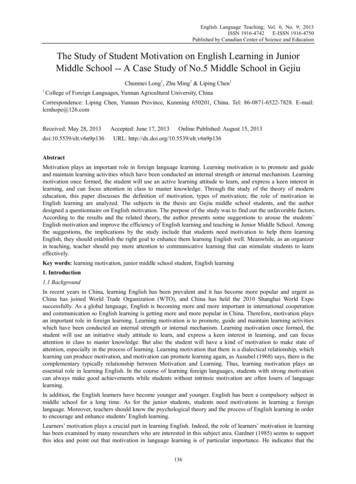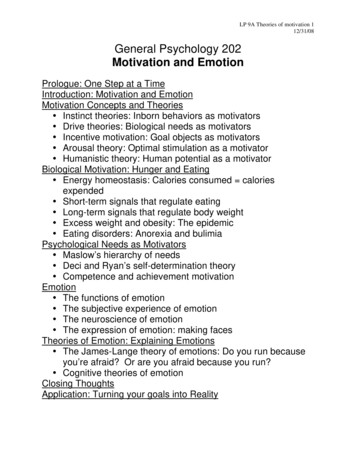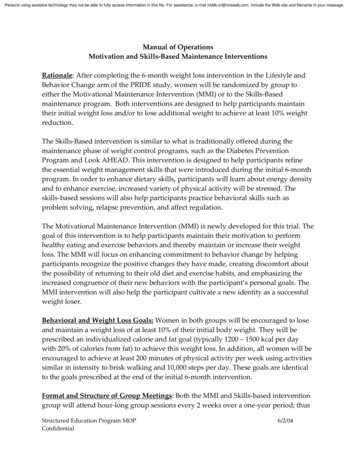
Transcription
Persons using assistive technology may not be able to fully access information in this file. For assistance, e-mail niddk-cr@imsweb.com. Include the Web site and filename in your message.Manual of OperationsMotivation and Skills‐Based Maintenance InterventionsRationale: After completing the 6‐month weight loss intervention in the Lifestyle andBehavior Change arm of the PRIDE study, women will be randomized by group toeither the Motivational Maintenance Intervention (MMI) or to the Skills‐Basedmaintenance program. Both interventions are designed to help participants maintaintheir initial weight loss and/or to lose additional weight to achieve at least 10% weightreduction.The Skills‐Based intervention is similar to what is traditionally offered during themaintenance phase of weight control programs, such as the Diabetes PreventionProgram and Look AHEAD. This intervention is designed to help participants refinethe essential weight management skills that were introduced during the initial 6‐monthprogram. In order to enhance dietary skills, participants will learn about energy densityand to enhance exercise, increased variety of physical activity will be stressed. Theskills‐based sessions will also help participants practice behavioral skills such asproblem solving, relapse prevention, and affect regulation.The Motivational Maintenance Intervention (MMI) is newly developed for this trial. Thegoal of this intervention is to help participants maintain their motivation to performhealthy eating and exercise behaviors and thereby maintain or increase their weightloss. The MMI will focus on enhancing commitment to behavior change by helpingparticipants recognize the positive changes they have made, creating discomfort aboutthe possibility of returning to their old diet and exercise habits, and emphasizing theincreased congruence of their new behaviors with the participant’s personal goals. TheMMI intervention will also help the participant cultivate a new identity as a successfulweight loser.Behavioral and Weight Loss Goals: Women in both groups will be encouraged to loseand maintain a weight loss of at least 10% of their initial body weight. They will beprescribed an individualized calorie and fat goal (typically 1200 – 1500 kcal per daywith 20% of calories from fat) to achieve this weight loss. In addition, all women will beencouraged to achieve at least 200 minutes of physical activity per week using activitiessimilar in intensity to brisk walking and 10,000 steps per day. These goals are identicalto the goals prescribed at the end of the initial 6‐month intervention.Format and Structure of Group Meetings: Both the MMI and Skills‐based interventiongroup will attend hour‐long group sessions every 2 weeks over a one‐year period; thusStructured Education Program MOPConfidential6/2/04
they will attend a total of 24 sessions. These sessions will be conducted by a groupleader(s) who has worked with these participants during the initial 6 months; care willbe taken to make sure that all group leaders conduct both motivational and skills‐basedmaintenance groups over the course of the study. Participants in both maintenanceapproaches will be weighed at the start of each session. The participants will continueto keep self monitoring diaries, which they will hand in at each session for review bythe interventionist. At the start of each session, the group leader will ask participants toprovide a progress report on their Keeping Track monitoring. The group leader willspecifically ask about issues that participants were encouraged to reflect on/keep trackof during the prior 2‐week period (the motivation arms will be keeping track ofdifferent behaviors related to the content of the session, but both arms will continue tokeep track of basic information related to their eating and exercise). The exerciseprescription that was established in the Lifestyle and Behavior Change Program willcontinue to be endorsed, and key messages about the importance of low fat/low calorieeating, daily monitoring, and weighing will still be offered as they relate to weightmaintenance.In the MMI, group sessions will be experiential and interactive in nature. Groupleaders will utilize motivational techniques that will support participants’ goals andhelp draw connections between overall life goals and specific weight loss goals. Thesessions are designed to ensure that key points are covered through discussions,exercises, and exposure to relevant media (e.g., videos, magazine articles ). At the endof each session, participants will be provided with a handout (called Session Overview)which briefly reviews the content of that session, suggests areas for participants tomonitor over the course of the following 2 weeks, and reminds them about the itemsthey will need to bring to the subsequent session.In the Skills‐Based Intervention, the group leader will present the basic information forthe session topic with more extensive handouts and a more distinctly problem solvingapproach to dealing with challenges and barriers faced by group members. Participantswill be given a chapter from the participant manual related to the session content withworksheets included and/or assignments for participants to complete. The final page ofthe packet will list program goals for the following 2 week period.Maintenance Programs MOPConfidential25/17/2005
Session Topics:The content of the MMI sessions will include the following 5 themes:1. Looking Back‐ recalling what life was like prior to weight loss/healthylifestyle changes2. Cultivating an identity as a successful weight loser/individual who hasadopted a healthier lifestyle3. Determining how one’s overall values fit with weight loss and exercise goals4. Developing the rationale and time for self‐care5. Cultivating a culture/environment that supports their new behaviors/lifestyle.Over the course of the 12‐month program, 5 sessions will be devoted to chronicling theweight loss journey in scrapbook or journal form. Participants are free to choose whichmedium they prefer. The participants will be informed in advance of the material tobring to these sessions, which will be related to the session content which was justcovered. The interventionist will bring to these sessions the scrapbook supplies, whichinclude fancy scissors, glue stick, markers, stickers, colored paper, magazines, and otherdecorative items. During the scrapbook/journaling sessions, the participants will beprompted to discuss the meaning/triggers/memories associated with the items theychose for their scrapbook page or the ideas they are capturing in their journals.The content of the Skills‐Based Intervention will include topics such as:1. Volumetrics: Eating more low energy density foods to feel full2. Emotional Eating: Strategies to cope with emotional triggers to overeating3. Relapse prevention: Planning for high‐risk situations4. Exercise variety: Introducing a range of activities to prevent boredom5. Eating in restaurant: Developing effective plans for eating away from home6. Managing holidays: Specific attention to weight maintenance strategies for theholiday seasonOver the course of the Skills‐Based Intervention program, a number of sessions will bedevoted to practicing the healthy eating and exercise skills through group activitiessuch as cooking demonstrations, tasting new recipes, and trying different types ofphysical activity. The participants will be informed ahead about these sessions so theycan dress appropriately. All cooking materials and foods for sampling will be providedby the intervention staff, as well new exercise videos, equipment and the like.Maintenance Programs MOPConfidential35/17/2005
General Procedures for Conducting Groups Treatment materials: In the MMI, participants will receive a handout (SessionOverview) at the end of each lesson which summarizes the main point of thelesson, offers ideas for self‐monitoring, and lists items to bring to the nextsession. In the Skills‐Based Intervention, participants will receive a chapterfrom the participant manual at the end of each lesson which includes thesession content, worksheets, “Making this lesson work for you”, and Pridehomework goals. Weigh‐ins: Participants will continue to be weighed prior to the start of eachsession and receive feedback in the same manner and tone as was providedduring the first 6 months of the Lifestyle and Behavior Change program.Participants will be encouraged to maintain their own graphs or records oftheir weight. Attendance: Attendance will be recorded at each meeting Make‐up sessions: Participants will be offered make‐up sessions when theymiss a session. This will include a weigh‐in and brief summary of what wasdiscussed in the session. If a participant is unable or unwilling to attend amake‐up session, the appropriate materials will be mailed to them. Make‐upsessions are the only occasion when individual sessions should be offeredduring maintenance; there should be no additional sessions, weigh‐ins, orcontact (beyond the group sessions and make‐up sessions). This will assurecomparable contact between the two maintenance treatment arms. Self‐monitoring and homework: In addition to monitoring dietary intake andphysical activity, participants will be asked to monitor behaviors related tothe content of the lesson just covered (e.g., in the MMI, the self‐monitoringassignment related to the lesson on creating an identity as a successful weightloser will have the participant recording the behaviors she engaged in whichhelp to reinforce this identity; in the Skills‐Based Intervention, the self‐monitoring assignment related to exercise variety will have participantstracking the new exercises they tried in that 2‐week interval). The groupleader will review the self‐monitoring diaries and make comments aboutbasic skills as well as specific tasks participants were asked to monitor overthe 2‐week interval. In both intervention arms, the core messages conveyedabout basic skills will be the same. But since participants in each arm will betracking different behaviors, the comments related to these behaviors willMaintenance Programs MOPConfidential45/17/2005
differ. Collective comments will be provided in one Keeping Track booklet,which will cover the self‐monitoring completed for both weeks. Session reminders: Study participants in both maintenance arms will be sent areminder postcard a week in advance of the meetings.Intervention Fidelity – in order to insure that all maintenance sessions are conducted asprescribed, the interventionists will complete an Intervention Fidelity Form at the endof each session. This form will indicate whether participants were weighed (yes/no),whether the Keep Track records were reviewed (yes/no) and whether the sessioncontact was delivered as prescribed (rated on a 5 point scale).Maintenance Programs MOPConfidential55/17/2005
Summary: Comparison of the MMI and Skills‐Based Intervention.Participants weighed‐in at groupmeetings with goal oflosing/maintaining 10%Participants given specific dietand physical activity goalsParticipants given specific mealplans and coupons for 1Slimfast/day with option of 2Slimfast/daySelf‐monitoring and homeworkassigned and presented at startof next sessionSelf‐monitoring reviewed byleader with feedback on behaviorchanges; tie‐back to currentlessons if appropriatePrescribed content for eachsessionParticipant manualFormal in class problem‐solvingScrapbooking/journalingCooking demonstration/physicalactivity practice sessionMake‐up sessions offeredMaintenance Programs YESYESYESNO (but handoutsprovided at end ofsession)NOYESNOYESYESYES6YESYESNOYES5/17/2005
PRIDECounselor’s ManualSession 25 : Maintaining Motivation on Your WeightLoss JourneyObjectivesIn this session participants will: Learn the rationale for the motivational maintenance program Introduce scrapbookingTo do before the sessionHave materials ready: Bring scrapbook supplies (scissors, scrapbooks, markers) Bring successful weight loser video Bring sample scrapbook pages to serve as models Bring homework handoutsI. WEIGH PARTICIPANTSWeigh participants and comment as appropriate. Refer to the Counselor Manualfor an overview of weighing issues.II. SESSION CONTENTA. Review Keeping TrackCheck that participants have continued with their daily self-monitoring. Review theirprogress in reaching weight and activity goals. Address any issues which may emergerelated to this.B. Present Program RationaleProvide a brief review of the purpose of this motivational program. Emphasize that theprogram is designed to help them stay motivated to perform healthy eating and exercisebehaviors. Discuss that weight loss is a journey and this program will help them see wherethey’ve been, where they are now, and where they are going.Thus far, we have helped you learn many new behaviors for weight loss (making betterfood choices to reduce fat and calories; increasing physical activity). Our goal now is toC:\Documents and Settings\abinantil\Desktop\PRIDE Lessons\c25.docSession 12/1/2011Page 1
PRIDECounselor’s Manualhelp you stay motivated to perform these new healthier eating and exercise behaviors. Ifyou continue to do these healthy behaviors, you will maintain your weight loss and/or loseadditional weight.When you first began your weight loss journey, your motivation level was probably at anall-time high. You were eager to hit the ground running and tackle your weight loss with avengeance. But, as time wore on, the novelty may have started to wear off and you mayhave found yourself wondering if all of the effort involved is really still worth it. You’vebeen counting calories, tracking steps, weighing ounces, and calculating pounds and youmay have gotten so mired in the details that it’s hard to remember why you’re doing all ofthis anyway! Perhaps you have lost sight of the big picture.Well, this maintenance program is meant to put that big picture back into bold relief! Inthis program, we will help you think about your “weight loss journey”: where you’vebeen, where you are, and where you’re going. In so doing, we hope to infuse new meaninginto it and inject new life into your weight maintenance efforts.C. Review the Themes of the Program You’ve Come a Long Way Baby – These lessons review the participants’ motivationfor joining the program and what it was like for them to be at a heavier weightTime to Brag – These lessons focus on the positive changes participants have madethus farWhy am I doing this anyway? – These lessons help participants think about theirvalues and how healthy eating and exercise fit with their valuesTaking care of yourself –These lessons focus on creating balance and fun in lifeCommitment Language – These lessons focus on how commitment fluctuates andwhat can be done to increase commitmentWhere do you go from here? – These lessons focus on what can be done now toincrease chances of future successHere’s a brief synopsis of what we’ll be covering in subsequent weeks:We’ll start our review of your weight loss journey by looking back at the beginning – atwhat motivated you to join the program in the first place. In these sessions (“You’ve Comea Long Way, Baby”), you will have an opportunity to look at how far you’ve come. It canbe mobilizing to reflect on what was tough about being at a heavier weight- to remindyourself why you don’t want to go back there. It can be easy to get caught up in what youhave yet to achieve (e.g., the stubborn last few pounds that you want to lose; the exercisethat you’re not doing) and to forget all of the progress you have made. Sometimes,remembering the positive changes can do more for your motivation than getting boggeddown by what’s left to do.After that we will talk about where you are now. In “Time to Brag”, you’ll have anopportunity to take stock of all the positive changes you have made that contribute to yourC:\Documents and Settings\abinantil\Desktop\PRIDE Lessons\c25.docSession 12/1/2011Page 2Deleted: your weight loss journey
PRIDECounselor’s Manualcontinued success. We will help you develop an identity of yourself as a successful weightloser and/or as an individual who is making healthier choices.After that, we will tackle the big question, “Why am I doing this anyway”?; What’s thepoint?”. You will have the chance to examine where healthy eating and exercise areplaced among the values most important to you, and see how your new eating andexercise behaviors can help you achieve your most important values.Another section of the program will be about “Taking Care of Yourself”! It’s difficult tomuster up the motivation to maintain your weight loss if there isn’t enough of a balance inyour life. So, we’ll look at what you consider fun and whether you are having enough fun(if you’re not, we will insist that you have more!). We’ll also ask each participant to sharetheir outlets for fun with the rest of the group so that we can all benefit!Finally, we will examine your motivation and commitment (Commitment Language) how itfluctuates over time and how you can make the most of it.Just as we started the program by looking to the past, we will end the program by lookingto the future and what the next chapter of the story holds for you. We help you build a“culture of support” to sustain your motivation when we are no longer meeting.(“Wheredo you go from here?”)Deleted: What about also mentioningbuilding culture of support?D. Show Video of Weight Loss JourneyExplain to participants that sometimes it helps to see an example of someone else’s“weight loss journey” to remember what the past was like. As they watch the video of aperson who has been very successful at weight loss, encourage them to think about thestages that she goes through in her journey. For example, ask them to think about what sheremembers about her life before her weight loss success, how she views herself now, andwhere she is heading for the future. Use the themes that emerge to help participants reflecton their own weight loss journey.E. Discuss scrap-booking/journalingDiscuss the plan to have each participant make a scrapbook or journal of their journey.Several sessions of the program will be devoted to working on this scrapbook or journal.We will do scrapbook pages for who they are now, what they remember from before theprogram, what changes they see in themselves, their values, and what the future may looklike. The scrapbook/journal will serve as a:1. Reminder of the progress the participant has made thus far2. A keepsake or memory of the journey that can be shared with friends and family3. An introduction to the art of scrapbooking/journaling- a fun and creative activityDiscuss ideas for the different types of things they could include in theirscrapbook/journal.C:\Documents and Settings\abinantil\Desktop\PRIDE Lessons\c25.docSession 12/1/2011Page 3Deleted: for you
PRIDECounselor’s Manual--photos of yourself (either before you lost weight and/or now)memorabilia from exercise events in which you participatedyour weight loss graphinspiring stories you have come across about others, who like yourself, aresucceeding in the battle to maintain their weighta copy of a particularly healthy eating day despite temptations aroundyou- from your Keeping Track booka poem you write about your weight loss journeya size tag from a clothing item- reflecting a drop in weightphotos of yourself engaging in a physical activityphotos of family members who are cheering you on and who indirectlybenefit from your better health (e.g., because of your weight loss, you arebetter able to play with your grandchildren)grocery store receipts reflecting your healthy food choicesmagazine clippings of inspirational stories related to weight loss andhealthy choiceschanges in your health indicesreminders of what it was like to be at a heavier weightscenes of places you find particularly inspiring to your weight maintenanceefforts.Leaf from a hike you tookMotivational quotesFormatted: Bullets and NumberingShow examples of other scrapbooks and pagesEmphasize that the scrapbook/journal is to help them think about their journey-it does nothave to be a work of art.It is important to realize that we are we are not trying to create a work of art. You do notneed to be artistic or creative for this endeavor. We are using scrap-booking/journaling asa new approach to help you think about your weight loss journey. Your scrapbook can beas inventive or artistic as you would like. So, feel free to express yourself in any way thatis pleasing to you! We only ask that your entries pertain to the themes listed above.F. Homework1. Review Behavioral GoalsBelow are the goals that will be in place throughout the rest of the programz Keep recording weight, diet and physical activity every dayz Be active—reach a goal of at least 10,000 steps per day and at least 200minutes per weekz Achieve and maintain a weight loss of at least 10% of initial body weight2. Distribute HandoutsC:\Documents and Settings\abinantil\Desktop\PRIDE Lessons\c25.docSession 12/1/2011Page 4
PRIDECounselor’s ManualzzzzCalendar of meetingsWeight graphScrapbook resource sheetHomework3. Review Homework Assignment For Next SessionAsk participants to bring in items for the first page of their scrapbook reflecting who theyare now. (See participant handout for examples).C:\Documents and Settings\abinantil\Desktop\PRIDE Lessons\c25.docSession 12/1/2011Page 5
PRIDECounselor’s ManualSession 26 : A Snapshot of you NOW – The FirstScrapbooking/Journaling SessionObjectivesIn this session participants will: Begin scrapbooking/journaling by doing a page that captures the person they areNOWReceive an introduction to the next few sessions which focus on helping participantslook back at themselves prior to starting the programTo do before the sessionHave materials ready: Bring scrapbook supplies (scissors, scrapbooks, markers) and journals Bring magazines participants can cut images fromI. WEIGH PARTICIPANTSWeigh participants and comment as appropriate. Refer to the Counselor Manualfor an overview of weighing issues.II. SESSION CONTENTA. Review Keeping TrackCheck that participants have continued with their daily self-monitoring. Review theirprogress in reaching weight and activity goals. Address any issues which may emergerelated to this.B. Review of ScrapbookingExplain to the participants that this is the first of a number of scrapbooking/journalingsessions. Remind them that they can use both the materials that they brought from homeas well as the center materials. Stress to the participants that they do not have to be a“great artist” to create a “great scrapbooking page.” The thing that makes it wonderful isthat it is meaningful to them. Encourage this to be a very open session in whichparticipants talk to each other about the page they are creating.C:\Documents and Settings\abinantil\Desktop\PRIDE Lessons\c26.docSession 12/1/2011Page 1
PRIDECounselor’s ManualYou may be thinking that you are not creative or artistic. You may be wondering if youcan make a page that looks “good.” The thing that makes a great scrapbooking page isone that tells YOUR story and is meaningful to you. So don’t worry if art is not yourthing. That isn’t what this is about at all! We want you to have fun while you are doingthis. It’s a great time to talk with your group about the page you are creating.C. Scrapbooking Session Focus: A snapshot of you NOWTell the participants that the page they are working on this week will illustrate the personthat they are today. They can use pictures, words, or anything else to create this page.If any of the participants are having trouble getting started with their scrapbook/journal,here are some prompts that you may use to help get them started. You can best do this bywalking around the room and working individually with participants who seem to bestuck.What adjectives describe you? You can try to find pictures or words of these traits.We all play different roles (mother, sister, daughter, teacher, tennis player, employee andfriend) and these roles partly define us. What are some of the different roles you play?What type of images can you use to illustrate these roles?Describe a typical “day in the life of YOU” How does your healthy eating and exercise fitinto your daily life? Can you incorporate that into your scrapbook/journal?D. Scrapbook Wrap UpGenerate some discussion at the end of the session about this first scrapbookingexperience.How do you think about yourself now?Does scrapbooking/journaling help you focus on some key aspects of who you are now?Why did you pick some of the images you selected?F. Homework1. Review Behavioral GoalsBelow are the goals that will be in place throughout the rest of the programz Keep recording weight, diet, and physical activity every dayz Be active—reach a goal of at least 10,000 steps per day and at least 200minutes per weekz Achieve and maintain a weight loss of at least 10% of their initial bodyweightC:\Documents and Settings\abinantil\Desktop\PRIDE Lessons\c26.docSession 12/1/2011Page 2
PRIDECounselor’s Manual2. Review Homework Assignment For Next SessionExplain to the participants that the next session will be the first of a few sessions focusingon how things were for the participants before they joined the PRIDE program. Keepingmemories “alive” about things that were negative in the past can help participants staymotivated to keep up their weight maintenance efforts. The participant handout listsspecific questions to help participants begin thinking about the past. Encourageparticipants to bring in any things that remind them of themselves before they joinedPRIDE. For example, an item of clothing that they may have saved from before they lostweight.C:\Documents and Settings\abinantil\Desktop\PRIDE Lessons\c26.docSession 12/1/2011Page 3
PRIDECounselor’s ManualSession 27 : You’ve Come a Long Way Baby!ObjectivesIn this session participants will: Reflect back on how their life was before losing weight Participate in numerous activities that will help them think about their past (e.g.reading weight loss success stories and discussing items they brought in from homesuch as old pictures or clothing.)To do before the sessionHave materials ready: Weight loss success stories Copies of the participant’s run in diary and incontinent episodes per weekinformation from baseline 2-3 backpacks depending on the number of participants in group 4-6 bags of flour (5 pounds each) Copy of each participant’s baseline interview videotape Print and distribute weight and exercise graphsI. WEIGH PARTICIPANTSWeigh participants and comment as appropriate. Refer to the Counselor Manualfor an overview of weighing issues.II. SESSION CONTENTA. Review Keeping TrackCheck that participants have continued with their daily self-monitoring. Review theirprogress in reaching weight and activity goals. Address any issues, which may emergerelated to this.B. Review of Rationale for looking back at life before losing weight.Note to leader: The theoretical rationale for this session comes from a paper byRothman on Behavioral Maintenance (Health Psychology, 2000, Vol 19 Number 1,pages 64-49). He notes: “People choose to maintain a behavior in order to preserve a2/1/2011Session 27Page 1
PRIDECounselor’s Manualfavorable situation and strive to avoid an alternative, less favorable state. Thus thedecision processes that guide behavioral maintenance can be conceptualized as anavoidance-based self-regulatory system in which progress is indicated by a sustaineddiscrepancy between a current state and an undesired reference state (Carver &Scheier, 1990).” This session helps participants look back at the difficulties createdby being overweight and thereby remain motivated to eat a healthier diet and bephysically active in order to avoid returning to that less favorable state. Althoughparticipants may note the progress they have already made, these positive changeswill be the focus of later lessons and should therefore not become the focus of thislesson.Explain to participants that one way to stay motivated is to spend some time looking backand remembering the negatives of their life prior to losing weight. Focusing on thisinformation may help strengthen the desire to NEVER go back to their previous weightand unhealthy habits.Provide participants with an overview of the different activities that are going to takeplace in this session.Today is the first session in a series of sessions in which we are going to spend some timelooking back at your life before you lost weight. By doing this, you will begin to recallsome of the difficulties and disadvantages to being overweight and inactive. The benefit ofdoing this is it can strengthen your desire to NEVER be there again. This can be a strongmotivator for keeping your weight off for the long term.We are going to help you reflect on the past in many different ways today. We are goingto read success stories from other people who have successfully lost weight. Each of youwill also have the chance to talk about the item you brought in from home. We also havebackpacks and bags of flour for you to wear to remind you of the extra weight that youused to carry around.C. Weight Loss Success StoriesPass out the different weight loss success stories to participants. These stories are meantto illustrate the difficulties associated with being overweight and the reasons why somepeople chose to lose weight. Ask the participants to read the story they are given and thenshare with the group a few key parts of the story (or pick one or 2 stories and ask aparticipant to read the story aloud to the whole group) These stories should serve as aspringboard to help participants remember the negatives they felt about being overweightand what triggered them to lose weight.Did the story remin
Structured Education Program MOP 6/2/04 Confidential Manual of Operations Motivation and Skills‐Based Maintenance Interventions Rationale: After completing the 6‐month weight loss intervention in the Lifestyle and Behavior Change arm
